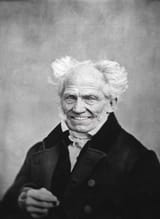ON WOMEN
>It is because women’s reasoning powers are weaker that they show more sympathy for the unfortunate than men, and consequently take a kindlier interest in them. On the other hand, women are inferior to men in matters of justice, honesty, and conscientiousness. Again, because their reasoning faculty is weak, things clearly visible and real, and belonging to the present, exercise a power over them which is rarely counteracted by abstract thoughts, fixed maxims, or firm resolutions, in general, by regard for the past and future or by consideration for what is absent and remote.
>Accordingly they have the first and principal qualities of virtue, but they lack the secondary qualities which are often a necessary instrument in developing it. Women may be compared in this respect to an organism that has a liver but no gall-bladder.
>Nothing different can be expected of women if it is borne in mind that the most eminent of the whole sex have never accomplished anything in the fine arts that is really great, genuine, and original, or given to the world any kind of work of permanent value. This is most striking in regard to painting, the technique of which is as much within their reach as within ours; this is why they pursue it so industriously. Still, they have not a single great painting to show, for the simple reason that they lack that objectivity of mind which is precisely what is so directly necessary in painting.
>The first love of a mother, as that of animals and men, is purely instinctive, and consequently ceases when the child is no longer physically helpless. After that, the first love should be reinstated by a love based on habit and reason; but this often does not appear, especially where the mother has not loved the father. The love of a father for his children is of a different nature and more sincere; it is founded on a recognition of his own inner self in the child, and is therefore metaphysical in its origin.
>Accordingly they have the first and principal qualities of virtue, but they lack the secondary qualities which are often a necessary instrument in developing it. Women may be compared in this respect to an organism that has a liver but no gall-bladder.
>Nothing different can be expected of women if it is borne in mind that the most eminent of the whole sex have never accomplished anything in the fine arts that is really great, genuine, and original, or given to the world any kind of work of permanent value. This is most striking in regard to painting, the technique of which is as much within their reach as within ours; this is why they pursue it so industriously. Still, they have not a single great painting to show, for the simple reason that they lack that objectivity of mind which is precisely what is so directly necessary in painting.
>The first love of a mother, as that of animals and men, is purely instinctive, and consequently ceases when the child is no longer physically helpless. After that, the first love should be reinstated by a love based on habit and reason; but this often does not appear, especially where the mother has not loved the father. The love of a father for his children is of a different nature and more sincere; it is founded on a recognition of his own inner self in the child, and is therefore metaphysical in its origin.

